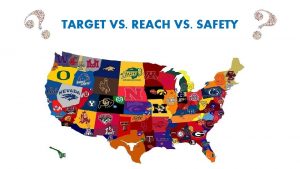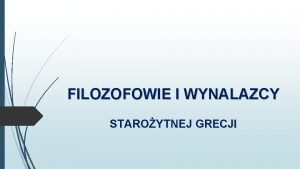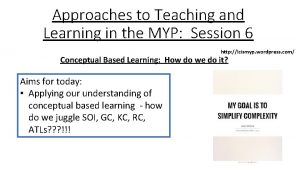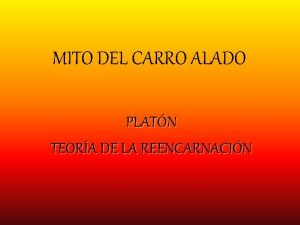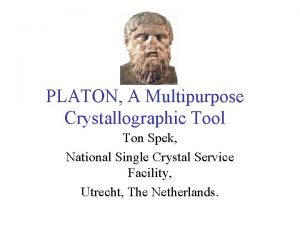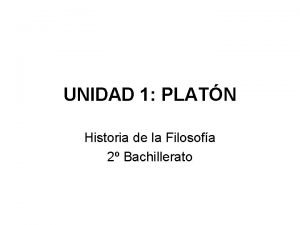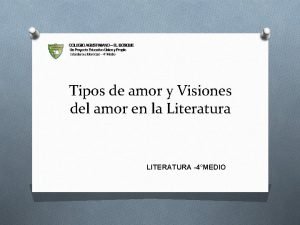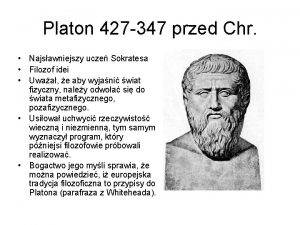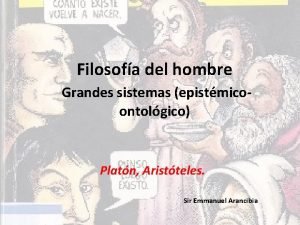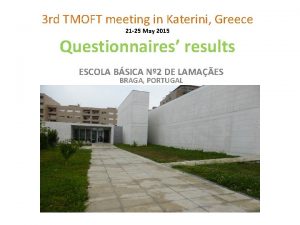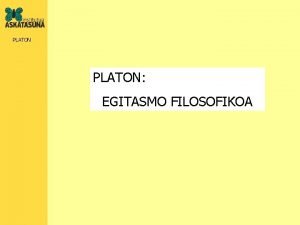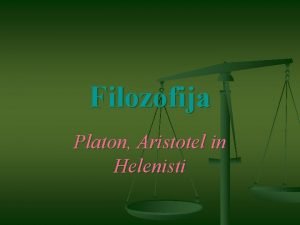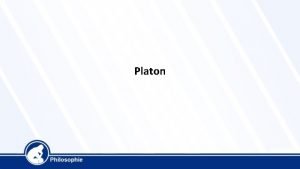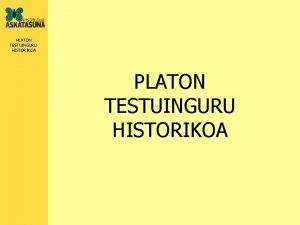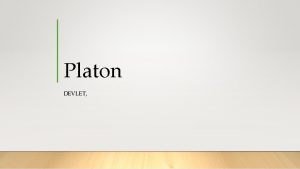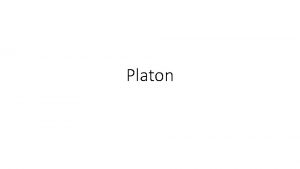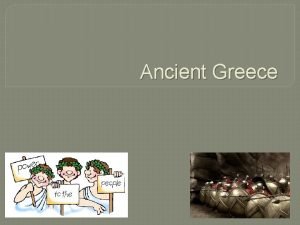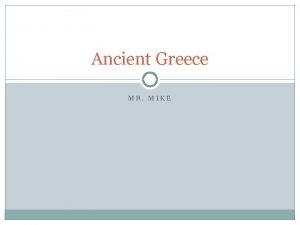PLATON SCHOOLS Katerini Pieria Greece Platon Schools v










- Slides: 10

PLATON SCHOOLS Katerini, Pieria, Greece

“Platon” Schools v v Organization type: Private school founded in 1997 Location: Katerini, Greece Number of students: 570 (for the academic year 2019 -2020) Four-level operation: Ø Kindergarten (ages: 1 -6) Ø Primary (ages: 7 -12) Ø Gymnasium (ages: 13 -15) Ø Lyceum (ages: 16 -18)

“Platon” Schools We envisioned and operated a school whose mission is: The cultivation of the spirit by seeking knowledge through individual and group creation. The shaping of characters that will accept and support social values. The formation of a healthy body through the dynamics of programs rich in sport activities. To support the students to become self-aware, to make decisions for themselves, to communicate with their peers, to prepare for their future, and to feel happy.

Educational System in Greece Innovative learning strategy applied by “Platon” School focuses on: The current structure of public schools could be described as: q q Strict Inflexible Examination-driven Resistant to application of new technologies Pupil Competence Community Technological support International cooperation Learning process (application modes) Individual value (Humanistic approach)

Technology and Innovation in education v v v ICT in education was firstly applied by “Platon” school 17 years ago on the basis of internet use as a source of information and communication. After 2000, we started the development of teaching material through the use of ICT, such as the development of Physlets (Java applets in Physical sciences), with excellent results in visualization and interactivity. Lego Robotics were also used for the programming and study of various phenomena. Lately, ICT tools, such as interactive whiteboard and LCMS (as moodle), were used extensively by a large number of educators. The moodle server developed, https: //moodle. educonlinux. eu/ , was used for: a. The creation of educating and teaching material b. Courses c. Cooperative project work between “Platon” school pupils and partner schools pupils. Participation in various European Schoolnet educational projects such as Green. Week, Futurenergia, Xperimania Member of School Innovation Net, http: //schoolnet. protovoulia. org/, which supports the development of educators’ initiatives and promotes education innovations in school.

EU Projects v Comenius 1: “Local History” (1997 – 2000). v Comenius 1: “Young Europeans sharing work and joy” (1999 – 2001). v Comenius 1: “Migration, Minorities and Prejudices in Europe” (2000 – 2002). v Lingua_e: “Katerini – Krefeld” (1999). v Lingua_e: “Forty years ago …Ten years after” (2000). v ETwinning: “Live. Guide - Cultural Walks in Europe” (2006). v ETwinning: “School management strategies to improve school organization and working environment” (2007). v Youth: “ Traditions and habits in Europe” (2003). v Youth: “Miguel Thervantes born in Greece, El Greco painted in Spain” (2004). v Minerva: “e. Phys, Towards an effective use of ICT in Science education” (2001 -2004). v v v Minerva: “Educon. Linux, Free and Open Source Server Based on Linux for Multi-Media. Classrooms in Schools and Universities” (2006 -2009). Comenius multilateral: “Speak, a school that speaks the language of its kids” (2008 -2010) Science and Society: “Materials Science, University-school partnerships for the design and implementation of research-based ICT-enhanced modules on Material Properties. ” (2007 -2009)

EU Projects Environmental network «MED S. O. S. » (2001 -2013) ENO: “Environmental Network Online” www. enoprogramme. org (1999 -2010) Comenius multilateral: “FIESTA” (2011 -2014 Comenius multilateral: “EUMOF” (2010 -2012) Comenius multilateral: “CAREM” (2012 -2014 Comenius multilateral: “KAREL” (2013 -2015) Erasmus+ : “EL 2 LE” (2014 -2016) Erasmus+ : “Storytelling-Sinbad” (2014 -2016) Erasmus+ : “Water”(2014 -2016) Erasmus+ : “A healthy mind in a healthy body”(2014 -2016) Erasmus+ : “Super scientists” (2014 -2016) Erasmus+ : “Early school leaving” (2014 -2016) Erasmus+ : “Bilingual education-a step ahead” (2014 -2016) Erasmus+ : “We are the world we are the children” (2014 -2016) Erasmus+ : ECHO (2015 -2017) Erasmus+ : Youth Multilingualism and Work Perspectives in Europe (2015 -2017) Erasmus+ : S. O. S. Planet a Robotics Project (2015 -2017)

EU Projects Erasmus+ : Key Pass (2015 -2017) Erasmus+ : ESF (2016 -2018) Erasmus+ : CHRIS (2016 -2018) Erasmus+ : Motiva (2016 -2018) Erasmus+ : Level (2016 -2018) Erasmus+ : Flipped Classroom (2016 -2018) Erasmus+ : Refugees (2016 -2018) Erasmus+ : Learn to Play (2016 -2018) Erasmus+: Science Girls (2016 -2018) Erasmus+ : i. Youth (2016 -2018)

EU Projects q Erasmus+ : i. Cap (2017 -2019) Erasmus+ : EDRKINDER – Montessori for Adolescent (2017 -2019) Erasmus+ : Open Science (2017 -2019) Erasmus+ : Space Guardians (2017 -2019) Erasmus+ : Digit (2017 -2019) Erasmus+ : Game on (2017 -2019) Erasmus+ : Anemelo (2017 -2019) Erasmus+: Digital World (2017 -2019) Erasmus+ : Young Europeans (2017 -2019) Erasmus+ : Student Tallent bank (2017 -2019

2 nd place in world competition for educational games

